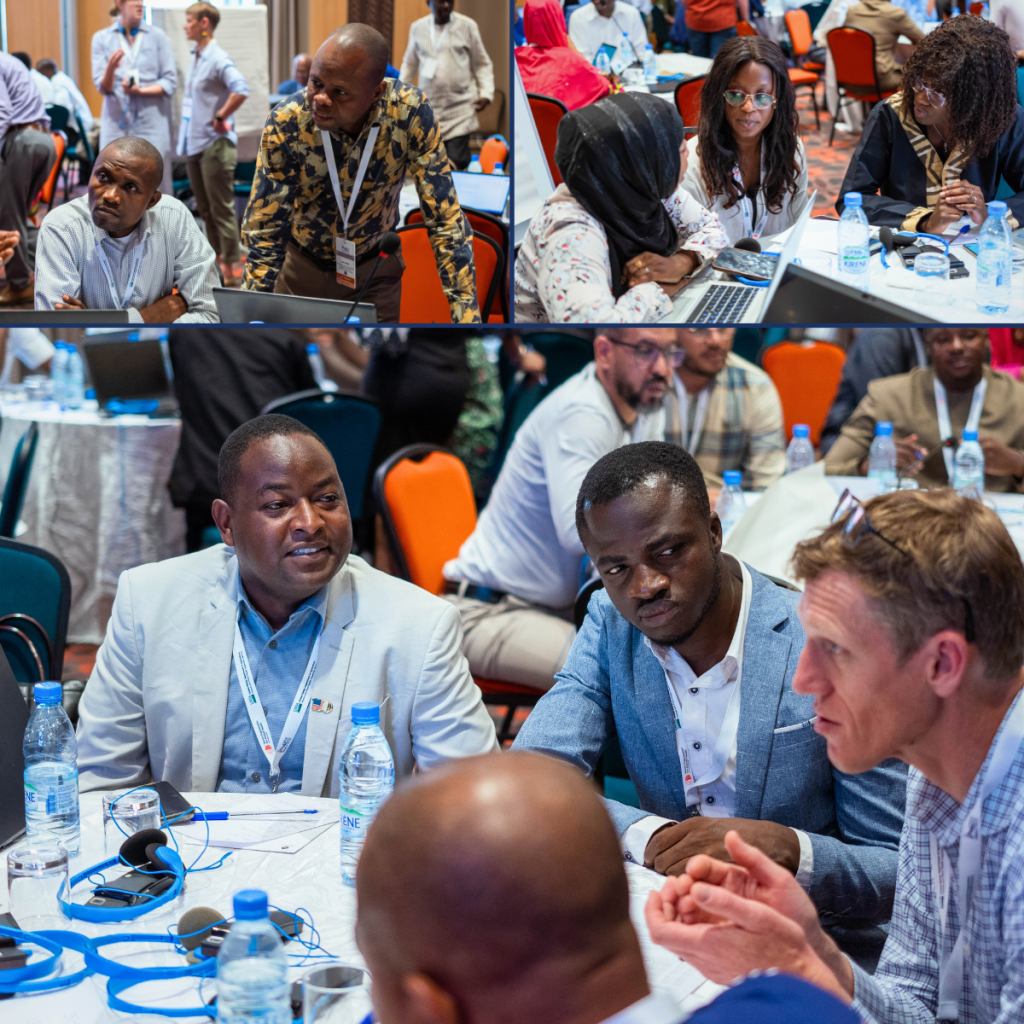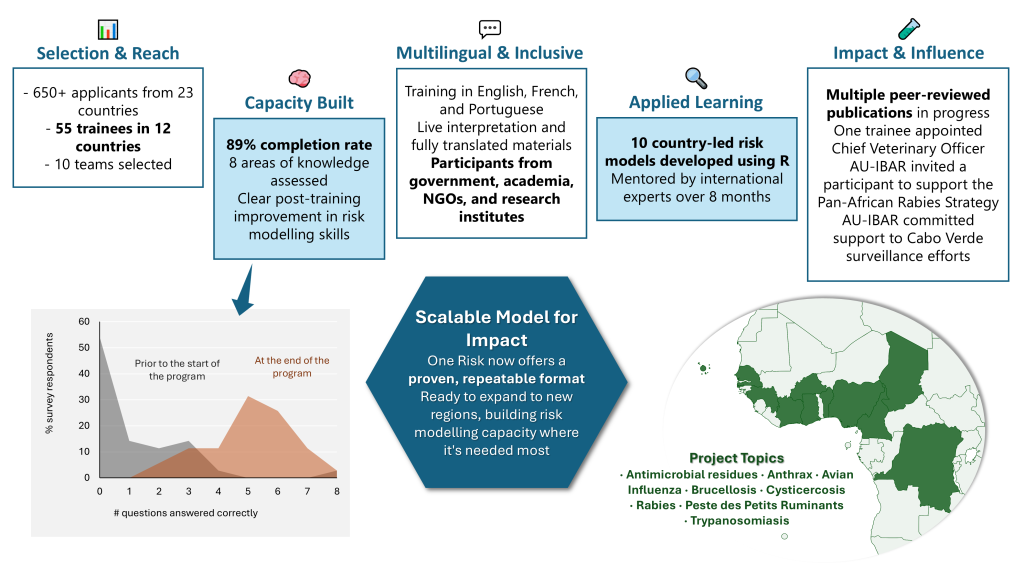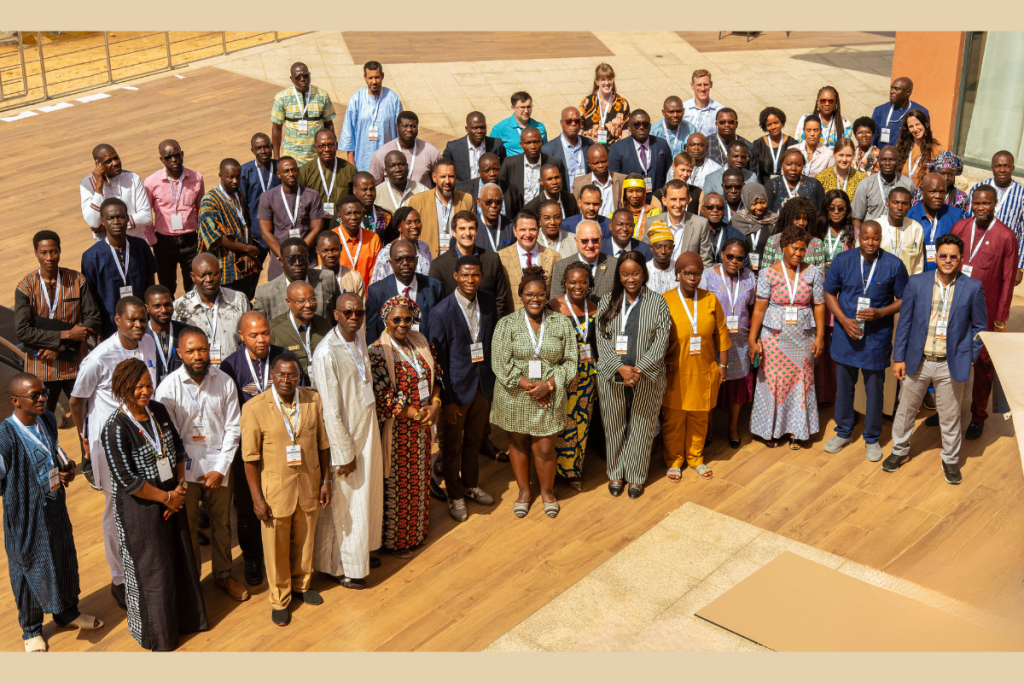From zoonotic diseases to trade and food safety, tackling One Health challenges starts with a clear understanding of risk, and the ability to turn available data and expertise into actionable insights. Recognising this need, the One Risk training initiative is equipping professionals in low and middle income countries with risk modelling skills, strengthening their capacity to translate data into decisions that improve One Health outcomes across regions.
Between 2023 and 2025, the One Risk programme led by EpiX Analytics, funded by the United States Department of Agriculture’s Animal and Plant Health Inspection Service (USDA-APHIS) and supported by the World Organisation for Animal Health (WOAH), brought together 55 professionals from 12 countries in West and Central Africa. Over 12 months of a mentorship-focused curriculum, they learned to apply quantitative risk modelling to complex health challenges at the interface between humans, animals, and the environment.
Let’s explore key lessons for strengthening regional capacity and collaboration from this innovative collaboration between WOAH, the USDA, and EpiX Analytics.
Infectious disease threats are increasingly global, complex, and interconnected. Whether it’s managing outbreaks, guiding safe trade of animals and products, or assessing antimicrobial risks, decisions on One Health risks need to be guided by data – and by those trained to analyse it effectively.
One Risk was developed to strengthen that capacity and was applied in the West and Central Africa region. Our mentorship-based programme focused on translating existing data and evidence into quantitative evidence for policy via the development of context-relevant risk models that could guide prevention and control at both national and regional levels.
The need for such capabilities was obvious in the programme’s selection process: in just three weeks, over 650 applicants from 23 West and Central African countries proposed project ideas, outlined relevant data sources, and assembled multidisciplinary teams. Selecting the final 55 participants was incredibly hard given the quality of the applications, once again showing the interest for such programme in the region.

One Risk workshop participants in Dakar, Senegal, June 2024. © EpiX Analytics, LLC.
We realised that in order to combat health threats such as antimicrobial resistance, zoonotic diseases, and challenges related to animal trade, an integrated and collaborative approach was essential.
Dr. Nancy Nswal (Antimicrobial Residues team) and Dr. Thierry Belinga Etogo (Anthrax Interventions team)
From theory to practice with mentors by their side
After introductory workshops and a month-long risk modelling course, teams spent almost a year working on their projects, with support from experienced mentors. This hands-on component is essential for building lasting risk modelling skills, as it provides an opportunity for learners to apply concepts and methods to their own data and risk questions.
Working in multidisciplinary teams from a multitude of institutes, participants applied stochastic modelling to build policy-relevant risk assessments using open-source statistical programming languages, overcoming data gaps and developing innovative solutions. Topics ranged from avian influenza in Côte d’Ivoire to brucellosis in Cabo Verde, anthrax surveillance in Cameroon, rabies in Nigeria, and antimicrobial residues in poultry products in DRC.

The One Risk cohort in West and Central Africa (2024–2025), a highly motivated group,
achieved an impressive completion rate, as shown in this visual summary. ©EpiX Analytics, LLC.
Results that matter: Policy influence, publications, and professional growth
The outcomes of One Risk reflect both individual dedication and regional impact. The highly motivated cohort achieved a remarkably high completion rate (with clear evidence of knowledge gain across key technical areas, and communication to both technical and lay audiences. Teams presented their findings at the final workshop attended by government officials, WOAH, USDA-APHIS, and international stakeholders, providing recommendations for improved surveillance, to guide vaccination strategies and mitigation measures, and to prioritise future data collection efforts.
One Risk has already opened new doors. Several teams are preparing peer-reviewed publications based on their work And some participants were selected for post graduate programmes and career advancement. For example, one trainee was invited by the African Union International Bureau for Animal Resources (AU-IBAR) to contribute to the development of the Pan-African Strategy for the Elimination of Rabies by 2030, highlighting the growing influence of One Risk alumni in shaping regional policy.

One Risk workshop participants in Dakar, Senegal, June 2024. Photo provided by author ©EpiX Analytics, LLC.
The programme clearly fostered collaboration between the teams, encouraging the sharing of expertise and interdisciplinary synergy. The eight-month commitment strengthened professional ties and initiated work dynamics that will continue beyond the program.
Dr. J.M. Feussom
–Deputy Director of Health Protection and Epidemiological Surveillance in Cameroon and Permanent Secretary of the Animal Disease Epidemiological Surveillance Network, Cameroon.
Regional Impact: Building a Community of Practice
Despite different languages and national contexts, all teams used R and a common training platform, with materials and live interpretation in English, French, and Portuguese. This inclusive, multilingual approach brought together professionals from diverse backgrounds, encouraged regular peer exchange and feedback, and not only built technical capacity but also strengthened lasting connections. Many teams are already planning follow-up projects beyond their original groups.
The programme’s Regional Advisory Committee (RAC) played a critical role in One Risk in West and Central Africa — supporting teams’ selection, delivering technical presentations, and moderating final workshop sessions. Beyond their technical input, RAC members strengthened the programme’s credibility, encouraged political backing, and helped foster key regional partnerships and stakeholder engagement.
The final workshop marked a key milestone—not only for presenting technical results, but also for gaining recognition from national, regional, and international stakeholders including several Chief Veterinary Officers, experts from regional research institutes and universities, WOAH, USDA-APHIS, and AU-IBAR. By showcasing country-led models and measurable technical progress, the event validated the teams’ work, raised the profile of individual participants, and demonstrated the programme’s policy relevance. For instance, AU-IBAR committed to supporting the Brucella surveillance plan proposed by the Cabo Verde team, based on a Bayesian forecasting model. This collective insight reinforces the importance of sustaining and expanding initiatives like One Risk to build long-term resilience and regional self-reliance in the face of evolving health threats.
One Risk has shown that building regional risk modelling capacity in low and middle income countries is not only possible – it’s impactful. Through mentorship, teamwork, and applied learning, professionals across West and Central Africa developed risk modeling skills and built real-world models that are already influencing surveillance and risk mitigation strategies and strengthening national and regional animal health and public health systems.
These outcomes go beyond individual training—they represent a growing network of scientists and decision-makers equipped to tackle today’s complex, cross-sectoral health risks. To build on this momentum, it is essential to support additional cohorts across low and middle income countries that can learn from and build upon the successes of earlier ones. Sustained investment is essential to ensure these professionals are recognised, resourced, and empowered to keep applying their expertise—through funding, institutional support, further education, and leadership opportunities.






